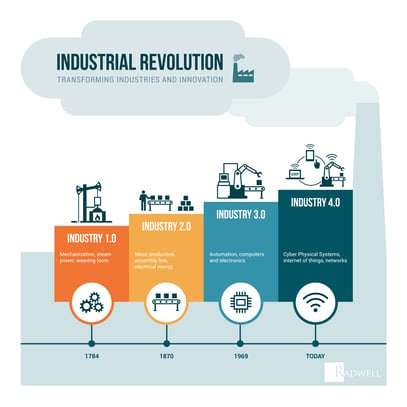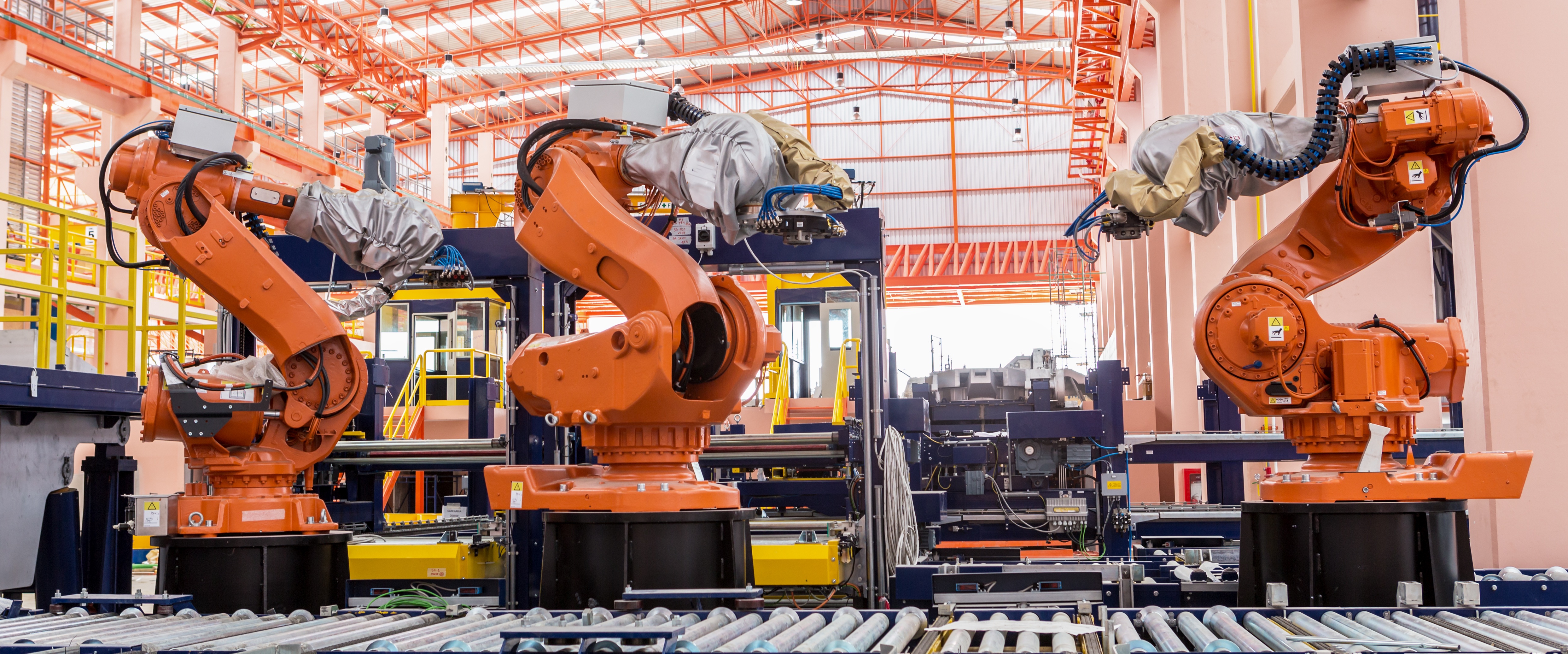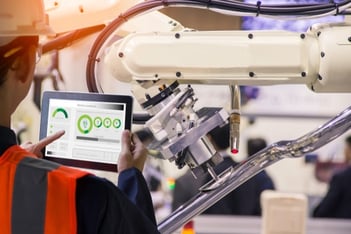
If you're wondering how Industry 4.0 will impact your organisation and other manufacturers across the globe, you're not alone. This new operational shift is changing things faster than most people realise, and if some futurists and experts are right, Industry 4.0 will lead to a sort of brave new world in manufacturing, unlike anything we've ever seen before.
The first Industrial Revolution remarkably changed the manufacturing industry in the first half of the 19th century. With steamships, railroads, and the mechanisation of processes in the agricultural and textile industries, the first Industrial Revolution didn't just help manufacturing businesses become more efficient. It created a social, cultural, and economic shift across the globe.
In the early 1900s, a second Industrial Revolution was born as manufacturers began using electricity to streamline production even further and mass production pushed back the boundaries of possibility. The start of the third Industrial Revolution could be dated back to the 1950s with the use of semiconductors and mainframe computing, but it really took hold in the 80s and 90s with the rise of the digital age and the Internet. While the world is still reeling from the digital revolution today, Industry 4.0 has already begun.
Industry 4.0 is a new era where manufacturers use Big Data, the IoT and interconnected computers to automate processes while minimising the need for human operators. The global value of all Industry 4.0 components is expected to exceed £4 trillion by 2020. You should be aware of the growing trend toward the utilisation of Industry 4.0 technology if you work in the manufacturing sector.
 Smart data and the Internet of Things have already changed manufacturing processes in many organisations. Experts predict that technology will disrupt the industry in remarkable ways. “Industry 4.0 is set to redefine the manufacturing industry, creating highly adaptable workspaces which are able to respond to customer requirements almost instantly”, says Martin Thomas, European Marketing Manager at Radwell International Ltd.
Smart data and the Internet of Things have already changed manufacturing processes in many organisations. Experts predict that technology will disrupt the industry in remarkable ways. “Industry 4.0 is set to redefine the manufacturing industry, creating highly adaptable workspaces which are able to respond to customer requirements almost instantly”, says Martin Thomas, European Marketing Manager at Radwell International Ltd.
Many smaller manufacturers are in denial about the radical shift taking place as a result of advances in Industry 4.0 technology. If you work in the manufacturing industry, you can’t afford to make that mistake. Large manufacturers are investing heavily in new technology to carve out a stronger competitive edge. Your company will lose ground if you don’t adapt with smart data and automated manufacturing technology.
If you are still sceptical, you should look at the growing number of Industry 4.0 patents that have been awarded over the last few years. In 2016 alone, over 5,000 Industry 4.0 patent applications were submitted to the European Patent Office. Samsung, LG, Sony, Intel, Amazon, Nokia and Blackberry are some of the biggest adopters of Industry 4.0 technology.
Manufacturers are becoming very reliant on smart data and automated manufacturing technology. Amazon spurred the discussion by using warehouse robots to help automate many of their fulfilment processes. The online retailing giant currently has over 100,000 warehouse robots. Brad Porter, the Vice President of Robotics for Amazon, says that warehouse automation and machine learning are going to have a profound impact on companies in numerous other industries.
A number of technologies are used to make smart manufacturing a reality, including the following:
Porter states that robots won’t entirely replace human employees in the immediate future, because they lack the ability to understand nuance and improvise. However, they are helping to reduce human error in many types of jobs. Numerous robots use highly advanced route planning algorithms to help associates fill customer orders. Other robots are designed to lift heavy products up to 24 feet.

Amazon is one of the companies that has received the most publicity for its utilisation of Industry 4.0 technology. However, this technology has been even more important for smaller companies operating on lower economies of scale, because it allows them to cut their long-term operating costs and boost production enough to compete with competitors that have been slow to adapt. One African gold mining company used similar technology to improve its profit margin by 3.7% and reduce annual costs by £20 million.
You need to consider the long-term benefits of using industry 4.0 technology in your manufacturing business.

You might be hesitant to adopt Industry 4.0 technology because the initial infrastructure costs can be high. However, the ROI can be substantial after you amortise the cost over time. You will also reduce the cost of human labour, waste and fines for compliance failures. You may also realise a massive increase in productivity. If you purchase the right manufacturing automation systems, it can pay for itself quickly.
Industry 4.0 technology also significantly improves the agility of manufacturing processes. Organisations can reduce the time it takes to deliver products by:
Industry 4.0 is already proving to be much more efficient. This will lead to faster product deliveries and better customer satisfaction in industries with high wait times.

Companies using Industry 4.0 technology can improve customer satisfaction by producing goods more rapidly. However, there are other reasons why it is invaluable for companies trying to offer better customer service.
Many customers need to refine their specifications and service models over time. Manufacturers have difficulty meeting their evolving expectations with older technology. Fortunately, smart data and automated manufacturing technology improve responsiveness. Manufacturers can alter the software they use to oversee production. A few slight modifications can have a profound impact on their manufacturing models, which makes it much easier for them to respond to new customer requests.
Employee injuries in the manufacturing industry are noticeably higher than most other sectors. The cost of injuries can be substantial because they consist of:
Automated manufacturing equipment enables companies to depend on smart technology to handle more dangerous tasks. This drastically reduces the risk of human injuries, which can have crippling costs on their bottom line.
Most Industry 4.0 advocates emphasise the scalability side of the equation. However, the technology can be equally beneficial when it comes to improving the quality of production.
Manufacturers that use smart technology depend on deep learning. Over time, this technology develops a better understanding of the products it develops. Users can test the material specifications and technological properties of goods. Smart manufacturing technology uses this information to improve the production process to create higher quality products.
 Manufacturing companies are more dependent on smart technology than ever before. They need to depend on companies that produce high-quality sensors, deep learning algorithms and IoT devices to help them meet their expectations,
Manufacturing companies are more dependent on smart technology than ever before. They need to depend on companies that produce high-quality sensors, deep learning algorithms and IoT devices to help them meet their expectations,
Radwell International Ltd has helped numerous clients improve their Industry 4.0 processes. They supply a large range of photoelectric sensors, pushbuttons, timers, circuit breakers and other electronic control devices. These smart devices are integrated into the IoT, which enables companies to streamline their production capabilities.
Companies like Radwell International understand that while smart technology is highly beneficial to manufacturers, it comes at a cost. They offer solutions to reduce the price point for their customers, including offering surplus parts and used components. They also repair smart technology, which is often more cost-effective than replacing it. These approaches are helping minimise the costs of adopting Industry 4.0 technology, which is making it more accessible to companies around the world.
800.884.5500
855.752.9393
+44 1782 576800
+49 2151 4475100